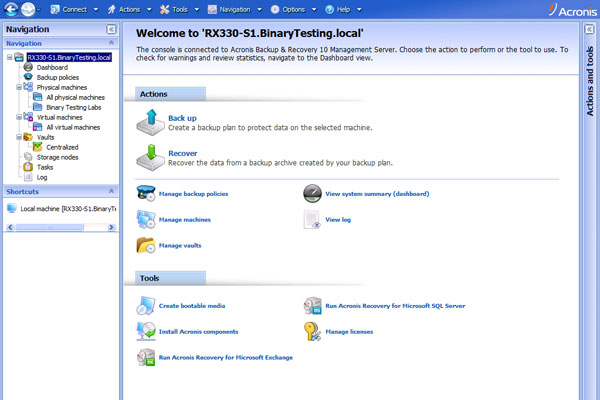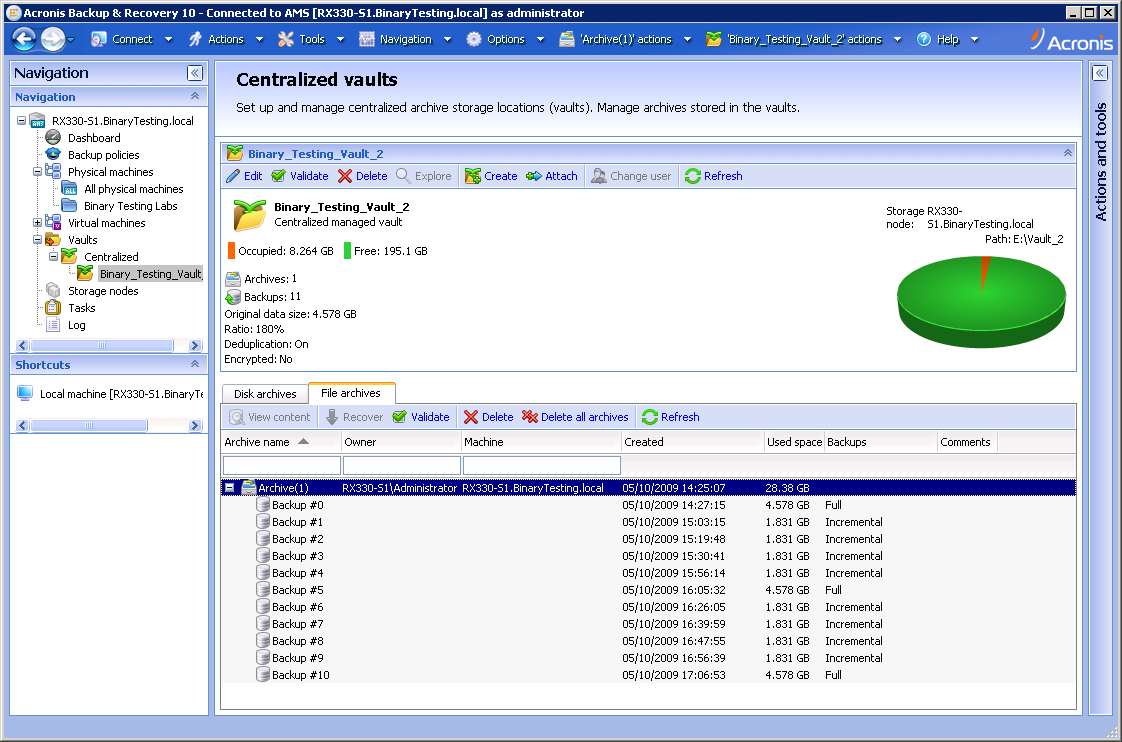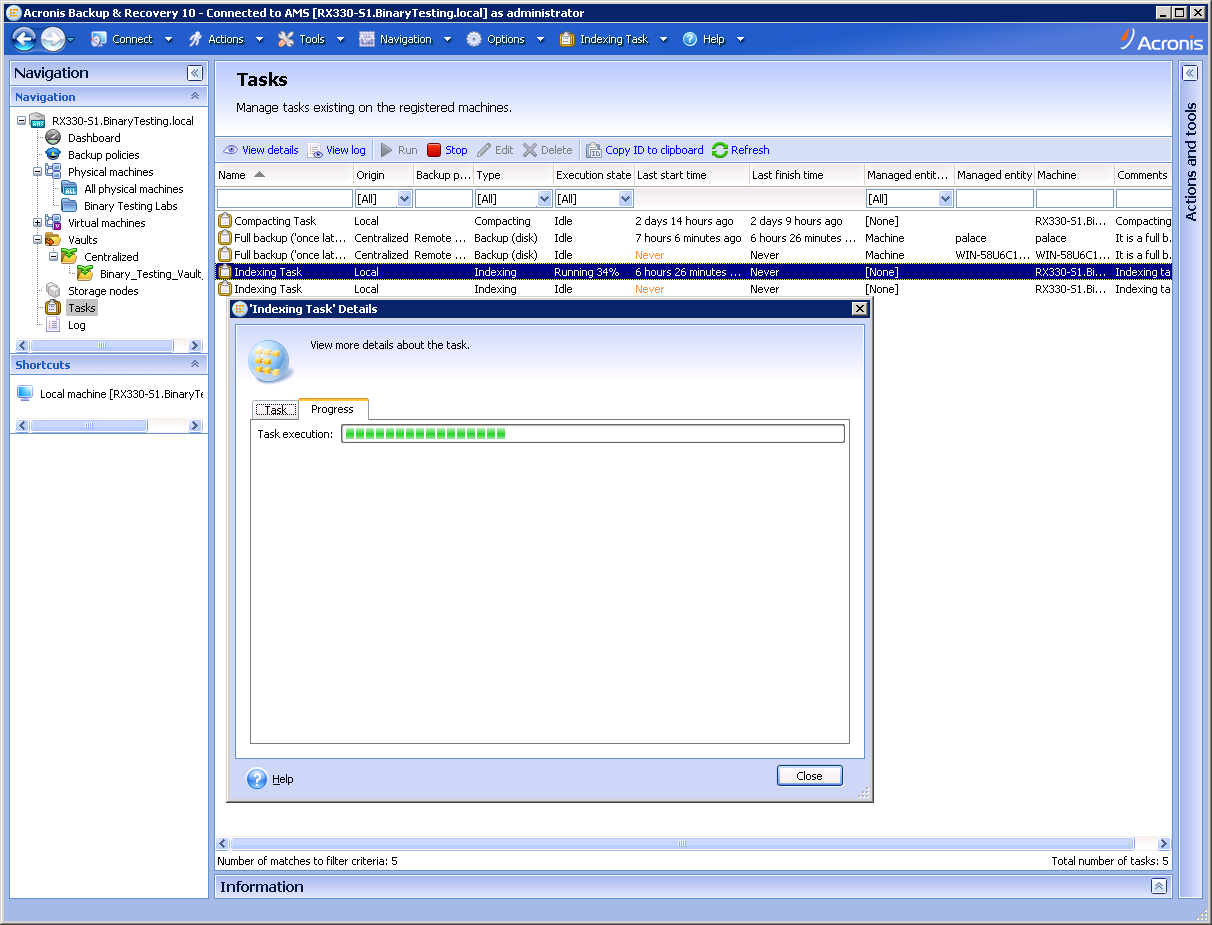Acronis Backup & Recovery 10 Advanced Server review
Acronis delivers plenty of features with its new server imaging software and adds data deduplication as an option. It’s a highly popular technology but has Acronis got it right?

Acronis is one of the best disk imaging products around and this latest version offers a fine selection of server data backup and recovery tools all easily accessible from a central management console. However, we were not impressed with the optional data deduplication feature. Although it returned good storage saving ratios, the extremely poor indexing performance makes it highly unsuited to large businesses whose data changes at a rapid rate.

Backup policies make light work of securing data on multiple servers as you browse the network and add each one along with global definitions of the files, folders, volumes or drives you want copied. A vault location needs to be assigned to the policy and Acronis also offers predefined backup strategies including a GFS rotation system with full and incremental backups.

Selecting a vault shows plenty of information about the contents of archives and space usage.
Acronis provides file and block level deduplication and can carry this out at both the source and target. The block level deduplication technology is fundamentally the same as that used by the majority of other solutions where the data stream is broken up into 4K chunks and a hash value is computed for each block of data using an algorithm that uniquely identifies it.
Acronis has no published claims about deduplication ratios so we used our standard set of tests to find out what it could do. Using a 4.5GB data set consisting of 600 files, we introduced controlled changes within a percentage of the files during a standard backup strategy consisting of daily incrementals and weekly full backups.

After backing up 44GB of data from a remote server we found the subsequent indexing task shockingly slow.
After the first full backup was completed, two per cent of the data was modified in 40 per cent of the files prior to each subsequent backup. After a two week simulation we saw Acronis deliver a deduplication ratio of 3.4:1 showing good savings on storage.
We also ran a full backup of a 44GB data volume on a remote Windows server. On completion, the size of the vault and index database was 29.2GB resulting in an initial deduplication ratio of 1.5:1 and a storage saving of about 33 per cent.
Sign up today and you will receive a free copy of our Future Focus 2025 report - the leading guidance on AI, cybersecurity and other IT challenges as per 700+ senior executives
Dave is an IT consultant and freelance journalist specialising in hands-on reviews of computer networking products covering all market sectors from small businesses to enterprises. Founder of Binary Testing Ltd – the UK’s premier independent network testing laboratory - Dave has over 45 years of experience in the IT industry.
Dave has produced many thousands of in-depth business networking product reviews from his lab which have been reproduced globally. Writing for ITPro and its sister title, PC Pro, he covers all areas of business IT infrastructure, including servers, storage, network security, data protection, cloud, infrastructure and services.
-
 Agile development might be 25 years old, but it’s withstood the test of time – and there’s still more to come in the age of AI
Agile development might be 25 years old, but it’s withstood the test of time – and there’s still more to come in the age of AINews While Agile development practices are 25 years old, the longevity of the approach is testament to its impact – and it's once again in the spotlight in the age of generative AI.
By Ross Kelly Published
-
 European Commission clears Google’s Wiz acquisition, citing 'credible competition' from Amazon and Microsoft
European Commission clears Google’s Wiz acquisition, citing 'credible competition' from Amazon and MicrosoftNews Regulators said there are “several credible competitors” to Google regardless of the acquisition
By Ross Kelly Published
-
 EU inaugurates NanoIC facility for next-generation chips
EU inaugurates NanoIC facility for next-generation chipsNews The project forms part of efforts to reduce reliance on US and Asian supply chains
By Emma Woollacott Published
